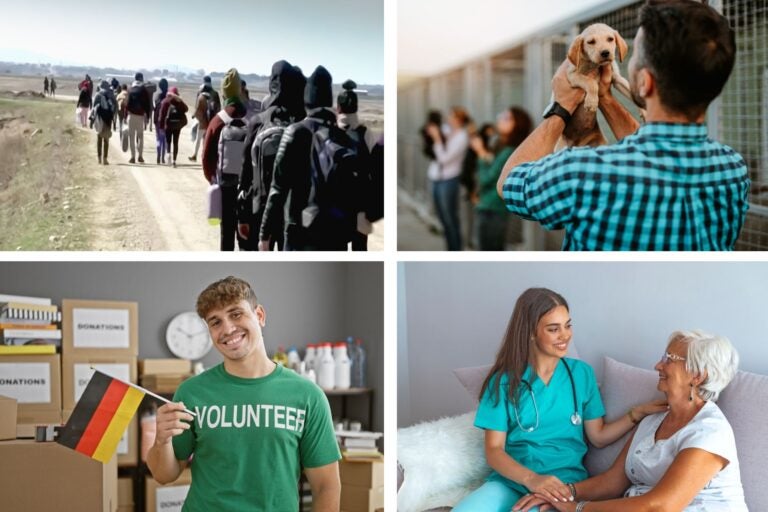Volunteering in Germany: Find the best option for you
Live your humanitarian adventure: The ultimate guide to volunteering in Germany with the best projects for 2025-2026.
If you’ve been dreaming of volunteering in Germany but aren’t sure where to begin, this blog is here to guide you. We’ll walk you through everything you need to know so you can take the first step with confidence. You’re about to embark on one of the most rewarding experiences out there and contribute to a meaningful cause while immersing yourself in one of Europe’s most influential cultures.
To get involved in this kind of volunteer work, it’s important to take a close look at the different projects available in Germany—whether it’s educational support, environmental conservation, refugee assistance, or social integration—so you can choose the one that truly inspires you. It’s also essential to be aware of the legal requirements and be ready to adapt to new customs and environments.
In this article, you’ll discover the benefits of volunteering in Germany and how to prepare for an experience that could transform both your personal and professional life. Keep reading to take the first step!
5 advantages of volunteering in Germany
Wondering what you’ll gain from volunteering in Germany? While it’s easy to focus on the help you’ll be offering, the truth is that your time and effort to support social or environmental causes will come back to you in meaningful ways. Germany has a lot of benefits that can stay with you for life. Here are the top five advantages you can look forward to:
- State funding: You have the chance to volunteer in Germany completely free of charge, thanks to government funding that covers all your expenses.
- Improved German language skills: Germany is one of the best places to pick up German naturally, and volunteering there gives you the perfect opportunity to do just that. The language will surround you every day, making it much easier to learn. Plus, many programs even include language classes.
- High quality of life and safety: Life in Germany is known for being comfortable and well-organized. As a volunteer, you’ll get to experience reliable public transport, access to healthcare even as a foreigner, or simply the sense of safety and the quality services available to residents.
- Current social causes: A large number of volunteer programs in Germany focus on supporting refugee integration, especially since the country has welcomed thousands of people from Syria, Afghanistan, Iraq, and more recently, Ukraine. This kind of work gives you meaningful experience to add to your professional resume.
- Internships: After completing your volunteer work in Germany, you can either pursue an internship with a related company or even find a job if you’re planning to stay longer in the country.
Requirements for volunteering in Germany
Along with your willingness to volunteer, there are some important requirements you’ll need to meet. These usually include legal aspects like the necessary documents to enter the country, as well as your commitment to the project and other criteria. Below, we’ve outlined these so you can check if you meet each one:
- Age: Most programs accept volunteers between 18 and 30 years old, although some specific projects may extend this range.
- Visa: If you’re an EU citizen, you won’t need a visa. But if you’re from outside Europe, you’ll need to apply for a type D volunteer visa, which lets you stay in Germany for the entire duration of your project.
- Medical insurance: Having comprehensive health insurance is mandatory in Germany. Many volunteer programs include it, so the organization will usually provide your coverage.
- Language level: Basic knowledge of German is an advantage, although some require an intermediate level.
- Minimum commitment: 25-35 hours per week, for a minimum period of two weeks or more, is usually required.
- Required documentation: You’ll need a valid passport, a cover letter, your resume, and sometimes a background check.
- Own funds: Although many programs cover room and board, some may ask for a small monthly contribution.
Make sure you have the best connection on your smartphone
Plan ahead and sort out your phone and internet setup before you arrive in Germany. It’s crucial to stay in touch with your coordinators, other volunteers, and your family at all times. Plus, having a reliable, fast connection will make it much easier to handle tasks like educational activities, research, or streaming videos during your volunteer work.
Holafly’s monthly plans are your best bet for reliable 5G coverage anywhere in Germany. Activation is quick and easy through their app, and with the unlimited plan, you can connect two devices at the same time for just $64.90 per month.
Important: If you are a frequent traveler and want to stay connected without worrying about expensive roaming or looking for a new SIM at every destination, Holafly’s subscription plans are for you. With a single eSIM, enjoy internet in more than 170 countries for a fixed price and no surprises on your bill. Travel without limits and connect easily and securely! 🚀🌍

Best volunteer programs in Germany
When choosing a volunteer program in Germany, it’s important to carefully review all the details. Make sure you understand the requirements, the expected volunteer hours, minimum stay, the city you’ll be living in, and the project’s goals. We’ve put together a selection of three organizations you might consider applying to:
1. Excellence Center Europe – Help for refugees in Halle
Since 2018, this organization has been running a volunteer program in Halle, Germany, focused on supporting refugees. It’s aimed at university students, professionals, and seniors who are motivated to help refugee families. Your role would include organizing educational workshops, sports and cultural activities, and promoting cross-cultural understanding.
By staying with Arab host families or in shared accommodations, you’ll get a truly immersive cultural experience and gain insight into the daily lives of people who have had to leave everything behind to escape their home countries. Here are the main features and requirements:
| Characteristics | Details |
| Requirements | Between 18 and 70 years of age, knowledge of German or English and motivation |
| Duration | 2 weeks |
| What is included | Accommodation with host families, medical insurance, Arabic and English classes, breakfast and certificate |
| Price | $1,026 |
2. Federal Volunteer Service – Bundesfreiwilligendienst
The Bundesfreiwilligendienst (BFD) is an official German government program that welcomes people of all ages to contribute to social, environmental, cultural, or community projects. It requires a serious commitment of about 40 hours per week, and in return, participants receive a modest monthly stipend.
If you’re interested in the environment, you can get involved in protecting nature reserves like Saxon Switzerland National Park. Tasks include trail maintenance, managing invasive species, marking routes, and helping visitors learn about the local plants and wildlife. This project is ideal for anyone passionate about nature:
| Characteristics | Details |
| Requirements | Any age, school training and social interest |
| Duration | From 12 to 24 months |
| What is included | Accommodation, social insurance, training and monthly stipend |
| Price | Free of charge, financed by the state |
3. Nature Park and Rescue Center – Animal care
Located in Rosengarten, Lower Saxony, just 25 km south of Hamburg, Wildpark Schwarze Berge is a wildlife rescue center dedicated to protecting native species like deer, wolves, foxes, wild boars, birds of prey, and rehabilitating wildlife. If you’re passionate about animals, you can help by feeding them, observing their behavior, cleaning enclosures, and guiding visitors.
| Characteristics | Details |
| Requirements | Over 18 and intermediate level of German, commitment and safety test |
| Duration | 5 hours per week for 6 months |
| What is included | Accommodation, meals, insurance, training, transportation and linguistic support |
| Price | Free of charge, financed by the state |

Types of volunteering jobs in Germany
Looking for more volunteer opportunities in Germany? The country offers a wide range of meaningful projects where your help can make a real difference. Each region has its own specific needs, so we’ll break down the most common programs and where they’re located. Beyond refugee support, animal care, and environmental work, you can also find opportunities like these:
1. School training and educational support
In neighborhoods with many refugee families, like Berlin-Neukölln or Nuremberg, volunteers often help out by running extra support classes. In places like North Rhine-Westphalia, some schools also need volunteers to guide teens struggling with career choices through workshops.
2. Child care and family support
If you enjoy working with children, you can volunteer with community homes, daycare centers, or after-school programs. One common area is Berlin-Moabit, where several NGOs support families of Turkish and Arab backgrounds. Your role might include supervising and playing with the kids, helping parents navigate school paperwork, and joining outings to encourage cultural exchange.
3. Support for women in vulnerable situations
You could support vulnerable women—like survivors of domestic abuse, immigrants, or asylum seekers—by volunteering at women’s shelters in places like Cologne and Hamburg. Volunteers there run empowerment workshops, offer legal guidance, and provide emotional support.
If you’re skilled in music, dance, cooking, or technology, you can use those talents to support these women. What they learn from you can make a big difference in their careers and help them feel more connected and less alone.
4. Community health and medical support
This type of volunteering in Germany is best suited for people with medical experience or training. While you won’t be working as a doctor, you’ll assist in prevention campaigns targeting vulnerable groups.
For example, in cities like Munich and Nuremberg, organizations such as the German Red Cross and Diakonie run mobile healthcare units where volunteers educate people about basic first aid and their health rights.
5. Cultural promotion
Germany is rich in culture, so if you’re passionate about the arts, you can volunteer to organize cultural events, film festivals, fairs, and intercultural exchange projects.
- Kulturladen Pumpe in Darmstadt: A cultural center that organizes theater and music workshops for young immigrants.
- Music festivals: The Juicy Beats Festival in Dortmund often relies on volunteers for stage logistics and audience service.
- Kollektiv e.V: A project in the city of Leipzig is restoring historic buildings for community cultural use.
How much does it cost to volunteer in Germany?
Keep in mind that if you decide to volunteer in Germany, some programs may cover accommodation and meals, but you’ll still need to budget for other expenses like your flight, local transportation, and daily personal costs. Here’s a rough guide to help you estimate your budget:
| Concept | Approximate cost |
| Program fee | Some are free and some require a fee starting at $300 |
| International flight | $113-455, depending on country of origin |
| Travel or medical insurance | $80-113 per month |
| Local transportation | $68-113 per month by cab or bus |
| Accommodation | $228-456 per month, if not included |
| Personal expenses | $56-113 |

What expenses can you save by volunteering in Germany?
- Room and board: The German government or the EU (through programs like CES, BFD, and local groups) supports many programs, which means they typically cover your housing and daily expenses.
- Health insurance: Funded initiatives include full insurance at no additional cost.
- Initial German course: Some organizations offer a free basic German language module for the first few weeks.
- Internal transportation: Most programs usually provide a public transport card to cover your commute to the workplace.
Frequently asked questions about volunteering opportunities in Germany
If you belong to the EU you do not need a visa, only your identity card, but for non-EU citizens a national visa type D is required.
Most programs expect you to have a basic grasp of German or English, and some require an intermediate level so you can easily connect with the team and locals.
Volunteer stays can range from as short as two weeks to as long as two years, depending on what you’re looking for. Most programs recommend spending at least two to three months to build meaningful connections with the project.
Yes, many projects allow you to combine your studies with volunteering about 20 hours per week, especially in local NGOs or ecological BFD.
If you’re from the EU, you can look for work without needing extra permits. But if you’re from outside the EU, you’ll need to apply for a work permit. Organizations usually assist with this process and also provide you with a certificate and a recommendation letter.





 Language
Language 


















 No results found
No results found



